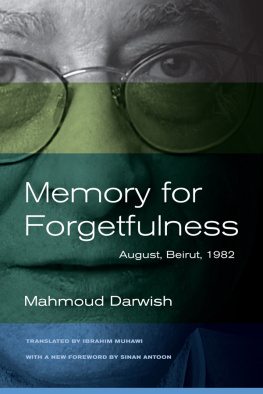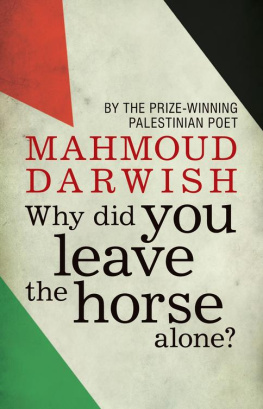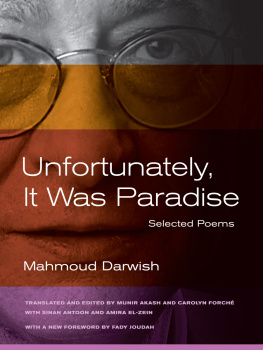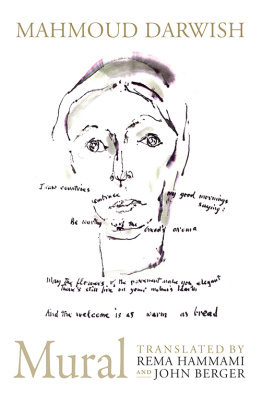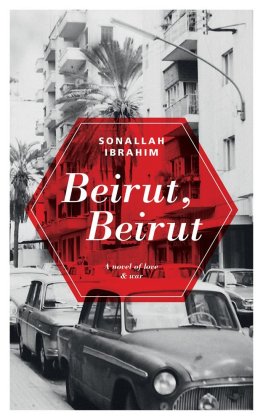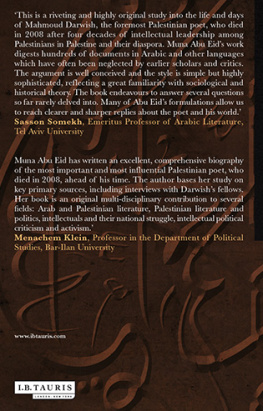
Memory for Forgetfulness
August, Beirut, 1982
| | | | | |
LITERATURE OF THE MIDDLE EAST
a series of fiction, poetry, and memoirs in translation
Memoirs from the Womens Prison
by Nawal El Saadawi
translated by Marilyn Booth
Arabic Short Stories
translated by Denys Johnson-Davies
The Innocence of the Devil
by Nawal El Saadawi
translated by Sherif Hetata
Memory for Forgetfulness: August, Beirut, 1982
by Mahmoud Darwish
translated by Ibrahim Muhawi
Aunt Safiyya and the Monastery
by Bahaa Taher
translated by Barbara Romaine
The Selected Poetry of Yehuda Amichai
newly revised and expanded edition
translated by Chana Bloch and Stephen Mitchell
The Selected Poetry of Dan Pagis
translated by Stephen Mitchell
Memory
for Forgetfulness
August, Beirut, 1982
Mahmoud Darwish
Translated, with an Introduction
by Ibrahim Muhawi
With a new Foreword
by Sinan Antoon

University of California Press
Berkeley|Los Angeles|London
University of California Press, one of the most distinguished university presses in the United States, enriches lives around the world by advancing scholarship in the humanities, social sciences, and natural sciences. Its activities are supported by the UC Press Foundation and by philanthropic contributions from individuals and institutions. For more information, visit www.ucpress.edu.
University of California Press
Berkeley and Los Angeles, California
University of California Press, Ltd.
London, England
1995, 2013 by The Regents of the University of California
ISBN: 978-0-520-27304-7
eISBN: 9780520954595
The original Arabic edition of this work appeared in Al Karmel, nos. 2122 (1986): 496. Al Karmel is the journal of the General Union of Palestinian Writers and Journalists (al-Ittihd al- mm li-l-Kuttb wa al Sahafiyyn al-Filastniyyn).
It is published by Bisan Press (Muassasat Bsn li-l-Sahfah wa al-Nashr wa al-Tawz), 4 Churchill Street, P.O. Box 4256, Nicosia, Cyprus. The Arabic title of the work is Dhkirah li-l-nisyn.
Previous edition catalogued as follows:
Library of Congress Cataloging-in-Publication Data
Darwsh, Mahmd
[Dhkirah lil-nisyn. English]
Memory for forgetfulness : August, Beirut, 1982 / Mahmoud Darwish; translated, with an introduction by Ibrahim Muhawi.
p.cm.
Includes bibliographical references.
ISBN 978-0-520-08768-2 (pbk.: alk. paper)
1. LebanonHistoryIsraeli intervention, 19821984Personal narratives, Palestinian. 2. Beirut (Lebanon)History. 3. Darwish, Mamd. I. Muhawi, Ibrahim, 1937. II. Title.
DS87-53.D365131982
956.92044dc2094-26351
Manufactured in the United States of America
22 21 20 19 18 17 16 15 14 13
10 9 8 7 6 5 4 3 2 1
In keeping with a commitment to support environmentally responsible and sustainable printing practices, UC Press has printed this book on Rolland Enviro 100, a 100% post-consumer fiber paper that is FSC certified, deinked, processed chlorine-free, and manufactured with renewable biogas energy. It is acid-free and EcoLogo certified.
Cest prcisment parce que joublie que je lis.
Roland Barthes
Contents
| | | | | |
Acknowledgments
| | | | | | | | | |
I would like to express my gratitude to the following people, without whose contribution this work would not be what it is.
To Emna Moalla, my colleague at the Facult des Lettres de la Manouba (Universit de TunisI), for giving unstintingly of her time in checking various drafts of the translation against the original. Her mastery of both Arabic and English is such as to inspire confidence; and, with a work like this one, this mastery was needed.
To Sheila Levine, of UC Press, for initial encouragement to proceed.
To Lynne Withey and Stephanie Fay, my present editors at UC Press, for dedicated enthusiasm, follow-up, and care with the manuscript; and to the editorial staff at UC Press, who continue to uphold the standard of excellence in book production.
To Ahmad Dahbour, a Palestinian poet and friend of Darwish, for being there when needed.
To my good friend, Nasreddine Hajjaj, a Palestinian writer and son of Ain Hilwe refugee camp in South Lebanon, for helping to see this work through and for providing invaluable assistance.
To Jane Muhawi, my wife and native ear, I owe more than I know how to put into words. Without her unfailing encouragement and her commitment, this work might never have been finished. And without her mastery of English, her native tongue, and her priceless literacy, the translation would not sound as it does.
Foreword
| | | | | |
Mahmoud Darwish died in 2008, leaving behind an astoundingly rich oeuvre. Although predominantly remembered and celebrated for his poetry, his prose works are equally unique and incandescent. His absence has only intensified the reverence and respect his writings command all over the world. Just as he himself wrote in his poignant self-elegy, In the Presence of Absence , a second life, promised by language, continues in us, his readers, as we return to his words again and again.
Memory for Forgetfulness is one of three major prose works Darwish wrote. Prose here is not the most satisfactory category, but rather the most convenient, to classify these works. These texts are teeming with poetry, in form as well as in style and spirit, and the boundary between poetry and its others is blurred and effortlessly transcended. The first of these three works was Yawmiyyat al-Huzn al-Adi (1973) (Journal of Ordinary Grief) beautifully translated by Ibrahim Muhawi, who also translated Dhakira lil-Nisyan (Memory for Forgetfulness) (1986). The last was Fi Hadrat al-Ghiyab (In the Presence of Absence), Darwishs own extended self-elegy written in 2006, two years before, and in anticipation of, his own death. While these three works share common themes and concerns, revisit and meditate on the poets past, and are at times considered a trilogy, each is a work unto its own. They each represent a unique moment in Darwishs personal trajectory, as well as a phase in the larger historical context both he and his works inhabited.
Like all of his works, this one is still very popular and was reprinted in Arabic numerous times. As I write this it is in its tenth edition. The subtitle August, Beirut, 1982 points to the event that triggered the text: the Israeli siege and bombardment of Beirut in 1982. A consideration of the immensity of the Beirut wound in Arab and Palestinian history and collective memory, as well as Beiruts enduring symbolic capital, is crucial for approaching and appreciating this works depth and resonance. Asked about Beirut more than two decades after being forced to leave it, Darwish professed his love for the city. I still carry my longing for Beirut until today... I have a beautiful ailment called the constant longing for Beirut, he said. For Darwish, as for so many others, Beirut was more than a mere city. It was a vibrant, rich, and complex cultural/political space. In Darwishs own words in this book:
Beirut is the place where Palestinian political information and expression flourished... the birthplace for thousands of Palestinians who knew no other cradle... [It] was an island upon which Arab immigrants dreaming of a new world landed. It was the foster mother of a heroic mythology that could offer the Arabs a promise other than that born of the June War [of 1967].... [It] became the property of anyone who dreamed of a different political order...
Next page
